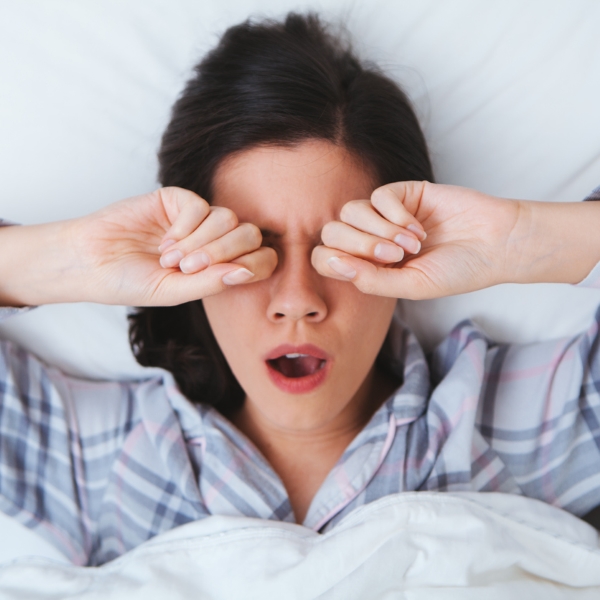The Main Stages of Sleep

Author: Jonathan Warren
There’s nothing better than waking from a full night’s sleep feeling refreshed and ready for the day. But, as you slept last night, did you realise that it’s highly likely that you experienced many different kinds of sleep?
It’s the combination and balance of these different types that can make us feel truly well-rested, and here we’re going to take a look at these stages in a little more detail.
 Falling asleep - NREM stages one and two
Have you ever experienced that falling sensation as you’re drifting off, or almost ‘jump’ yourself awake as you’re dozing? These are tell-tale signs that your brain is beginning to switch off for the night, and is often referred to as non-rapid eye movement (or NREM) stage one.
In this stage, you might find that your sleepiness comes in a wave-like pattern, where your consciousness drifts in and out a little bit. You’re also likely to be easily woken - hence the jumpiness and falling sensations! In terms of your body, you might find that your breathing slows down a little, as does your blood pressure. Your body might begin to feel a bit cold, and soon you might find yourself falling into NREM stage two.
In this stage, those rapid eye movements slow down, which means you’re much less jerky than in stage one. It’s harder for you to be woken up in this ‘light sleep’ stage, and your body begins to start relaxing as your metabolism functions slow and your brain begins to emit larger waves less frequently. Sleep experts tend to believe that we actually spend 45% of our sleeping time in this stage.
The transitional stage - NREM stage three
There still seems to be a general lack of consensus surrounding NREM stage three. Some experts say that it’s the bridge between NREM and true REM sleep, whereas others seem to categorise it as actual early REM sleep.
Either way, the physical signs of this stage of sleep are the same. You will find that it might not last very long - around 35 to 45 minutes after falling asleep, if you’re lucky enough to not be caught in NREM stage two. During this stage, your brain function flits between producing very slow, steady waves called delta waves and fast but tiny waves.
For the most part, you’ll find that you’re able to sleep through most things that go bump in the night, but the mixed brain waves can trigger episodes of sleepwalking, sleep-talking and unfortunately, night terrors and bedwetting. Waking from this stage can make you feel a bit woozy and disoriented - after all, your brain needs a second to catch up with your awake body!
Falling asleep - NREM stages one and two
Have you ever experienced that falling sensation as you’re drifting off, or almost ‘jump’ yourself awake as you’re dozing? These are tell-tale signs that your brain is beginning to switch off for the night, and is often referred to as non-rapid eye movement (or NREM) stage one.
In this stage, you might find that your sleepiness comes in a wave-like pattern, where your consciousness drifts in and out a little bit. You’re also likely to be easily woken - hence the jumpiness and falling sensations! In terms of your body, you might find that your breathing slows down a little, as does your blood pressure. Your body might begin to feel a bit cold, and soon you might find yourself falling into NREM stage two.
In this stage, those rapid eye movements slow down, which means you’re much less jerky than in stage one. It’s harder for you to be woken up in this ‘light sleep’ stage, and your body begins to start relaxing as your metabolism functions slow and your brain begins to emit larger waves less frequently. Sleep experts tend to believe that we actually spend 45% of our sleeping time in this stage.
The transitional stage - NREM stage three
There still seems to be a general lack of consensus surrounding NREM stage three. Some experts say that it’s the bridge between NREM and true REM sleep, whereas others seem to categorise it as actual early REM sleep.
Either way, the physical signs of this stage of sleep are the same. You will find that it might not last very long - around 35 to 45 minutes after falling asleep, if you’re lucky enough to not be caught in NREM stage two. During this stage, your brain function flits between producing very slow, steady waves called delta waves and fast but tiny waves.
For the most part, you’ll find that you’re able to sleep through most things that go bump in the night, but the mixed brain waves can trigger episodes of sleepwalking, sleep-talking and unfortunately, night terrors and bedwetting. Waking from this stage can make you feel a bit woozy and disoriented - after all, your brain needs a second to catch up with your awake body!
 The good stuff - REM stage four
If you’re lucky enough to have navigated your way through the first three stages of sleep - congratulations! Your brain and body are now rewarded with the most restorative kind of slumber - REM sleep.
As the name suggests, in this stage your eyes are incredibly active beneath your eyelids. In fact, your brain is almost emulating the kind of functions it would be doing when you’re awake, which is likely to be the reason why you might dream most vividly in this stage. Where your breathing and blood pressure might have been slow and steady before, here it can become a little irregular again - but that’s not to say you’re more awake.
This is the deepest sleep stage, and plays a vital part in the sleep cycle. Though your brain is seemingly going a mile a minute, your muscles stay in an almost-paralyzed state of relaxation.
It’s a circle of sleep
Though there are four very distinct stages when it comes to sleep, it doesn’t necessarily follow that you’ll transition seamlessly between all four, from dusk until dawn. It’s much more likely that you’ll dance around the early stages (one to three) of sleep for the majority of the night.
REM sleep (stage four) will happen too, but it’ll be it fits and bursts - smaller ones at first, before heading towards longer episodes of it towards the end of the sleeping period. Some experts say that most adults will experience five to six REM cycles each night! For more information on how long you should sleep for each night, take a look at our article here.
Though knowing about the stages of sleep can help some understand their slumber habits better, it can be a cause of frustration too - especially if you find you’ve got a little bit of a mental block preventing you from getting past that first stage! Take a look at our sleep hacks to equip yourself with some new sleep skills.
Images: ©iStock.com/Anson; ©iStock.com/agrobacter
The good stuff - REM stage four
If you’re lucky enough to have navigated your way through the first three stages of sleep - congratulations! Your brain and body are now rewarded with the most restorative kind of slumber - REM sleep.
As the name suggests, in this stage your eyes are incredibly active beneath your eyelids. In fact, your brain is almost emulating the kind of functions it would be doing when you’re awake, which is likely to be the reason why you might dream most vividly in this stage. Where your breathing and blood pressure might have been slow and steady before, here it can become a little irregular again - but that’s not to say you’re more awake.
This is the deepest sleep stage, and plays a vital part in the sleep cycle. Though your brain is seemingly going a mile a minute, your muscles stay in an almost-paralyzed state of relaxation.
It’s a circle of sleep
Though there are four very distinct stages when it comes to sleep, it doesn’t necessarily follow that you’ll transition seamlessly between all four, from dusk until dawn. It’s much more likely that you’ll dance around the early stages (one to three) of sleep for the majority of the night.
REM sleep (stage four) will happen too, but it’ll be it fits and bursts - smaller ones at first, before heading towards longer episodes of it towards the end of the sleeping period. Some experts say that most adults will experience five to six REM cycles each night! For more information on how long you should sleep for each night, take a look at our article here.
Though knowing about the stages of sleep can help some understand their slumber habits better, it can be a cause of frustration too - especially if you find you’ve got a little bit of a mental block preventing you from getting past that first stage! Take a look at our sleep hacks to equip yourself with some new sleep skills.
Images: ©iStock.com/Anson; ©iStock.com/agrobacter
 Falling asleep - NREM stages one and two
Have you ever experienced that falling sensation as you’re drifting off, or almost ‘jump’ yourself awake as you’re dozing? These are tell-tale signs that your brain is beginning to switch off for the night, and is often referred to as non-rapid eye movement (or NREM) stage one.
In this stage, you might find that your sleepiness comes in a wave-like pattern, where your consciousness drifts in and out a little bit. You’re also likely to be easily woken - hence the jumpiness and falling sensations! In terms of your body, you might find that your breathing slows down a little, as does your blood pressure. Your body might begin to feel a bit cold, and soon you might find yourself falling into NREM stage two.
In this stage, those rapid eye movements slow down, which means you’re much less jerky than in stage one. It’s harder for you to be woken up in this ‘light sleep’ stage, and your body begins to start relaxing as your metabolism functions slow and your brain begins to emit larger waves less frequently. Sleep experts tend to believe that we actually spend 45% of our sleeping time in this stage.
The transitional stage - NREM stage three
There still seems to be a general lack of consensus surrounding NREM stage three. Some experts say that it’s the bridge between NREM and true REM sleep, whereas others seem to categorise it as actual early REM sleep.
Either way, the physical signs of this stage of sleep are the same. You will find that it might not last very long - around 35 to 45 minutes after falling asleep, if you’re lucky enough to not be caught in NREM stage two. During this stage, your brain function flits between producing very slow, steady waves called delta waves and fast but tiny waves.
For the most part, you’ll find that you’re able to sleep through most things that go bump in the night, but the mixed brain waves can trigger episodes of sleepwalking, sleep-talking and unfortunately, night terrors and bedwetting. Waking from this stage can make you feel a bit woozy and disoriented - after all, your brain needs a second to catch up with your awake body!
Falling asleep - NREM stages one and two
Have you ever experienced that falling sensation as you’re drifting off, or almost ‘jump’ yourself awake as you’re dozing? These are tell-tale signs that your brain is beginning to switch off for the night, and is often referred to as non-rapid eye movement (or NREM) stage one.
In this stage, you might find that your sleepiness comes in a wave-like pattern, where your consciousness drifts in and out a little bit. You’re also likely to be easily woken - hence the jumpiness and falling sensations! In terms of your body, you might find that your breathing slows down a little, as does your blood pressure. Your body might begin to feel a bit cold, and soon you might find yourself falling into NREM stage two.
In this stage, those rapid eye movements slow down, which means you’re much less jerky than in stage one. It’s harder for you to be woken up in this ‘light sleep’ stage, and your body begins to start relaxing as your metabolism functions slow and your brain begins to emit larger waves less frequently. Sleep experts tend to believe that we actually spend 45% of our sleeping time in this stage.
The transitional stage - NREM stage three
There still seems to be a general lack of consensus surrounding NREM stage three. Some experts say that it’s the bridge between NREM and true REM sleep, whereas others seem to categorise it as actual early REM sleep.
Either way, the physical signs of this stage of sleep are the same. You will find that it might not last very long - around 35 to 45 minutes after falling asleep, if you’re lucky enough to not be caught in NREM stage two. During this stage, your brain function flits between producing very slow, steady waves called delta waves and fast but tiny waves.
For the most part, you’ll find that you’re able to sleep through most things that go bump in the night, but the mixed brain waves can trigger episodes of sleepwalking, sleep-talking and unfortunately, night terrors and bedwetting. Waking from this stage can make you feel a bit woozy and disoriented - after all, your brain needs a second to catch up with your awake body!
 The good stuff - REM stage four
If you’re lucky enough to have navigated your way through the first three stages of sleep - congratulations! Your brain and body are now rewarded with the most restorative kind of slumber - REM sleep.
As the name suggests, in this stage your eyes are incredibly active beneath your eyelids. In fact, your brain is almost emulating the kind of functions it would be doing when you’re awake, which is likely to be the reason why you might dream most vividly in this stage. Where your breathing and blood pressure might have been slow and steady before, here it can become a little irregular again - but that’s not to say you’re more awake.
This is the deepest sleep stage, and plays a vital part in the sleep cycle. Though your brain is seemingly going a mile a minute, your muscles stay in an almost-paralyzed state of relaxation.
It’s a circle of sleep
Though there are four very distinct stages when it comes to sleep, it doesn’t necessarily follow that you’ll transition seamlessly between all four, from dusk until dawn. It’s much more likely that you’ll dance around the early stages (one to three) of sleep for the majority of the night.
REM sleep (stage four) will happen too, but it’ll be it fits and bursts - smaller ones at first, before heading towards longer episodes of it towards the end of the sleeping period. Some experts say that most adults will experience five to six REM cycles each night! For more information on how long you should sleep for each night, take a look at our article here.
Though knowing about the stages of sleep can help some understand their slumber habits better, it can be a cause of frustration too - especially if you find you’ve got a little bit of a mental block preventing you from getting past that first stage! Take a look at our sleep hacks to equip yourself with some new sleep skills.
Images: ©iStock.com/Anson; ©iStock.com/agrobacter
The good stuff - REM stage four
If you’re lucky enough to have navigated your way through the first three stages of sleep - congratulations! Your brain and body are now rewarded with the most restorative kind of slumber - REM sleep.
As the name suggests, in this stage your eyes are incredibly active beneath your eyelids. In fact, your brain is almost emulating the kind of functions it would be doing when you’re awake, which is likely to be the reason why you might dream most vividly in this stage. Where your breathing and blood pressure might have been slow and steady before, here it can become a little irregular again - but that’s not to say you’re more awake.
This is the deepest sleep stage, and plays a vital part in the sleep cycle. Though your brain is seemingly going a mile a minute, your muscles stay in an almost-paralyzed state of relaxation.
It’s a circle of sleep
Though there are four very distinct stages when it comes to sleep, it doesn’t necessarily follow that you’ll transition seamlessly between all four, from dusk until dawn. It’s much more likely that you’ll dance around the early stages (one to three) of sleep for the majority of the night.
REM sleep (stage four) will happen too, but it’ll be it fits and bursts - smaller ones at first, before heading towards longer episodes of it towards the end of the sleeping period. Some experts say that most adults will experience five to six REM cycles each night! For more information on how long you should sleep for each night, take a look at our article here.
Though knowing about the stages of sleep can help some understand their slumber habits better, it can be a cause of frustration too - especially if you find you’ve got a little bit of a mental block preventing you from getting past that first stage! Take a look at our sleep hacks to equip yourself with some new sleep skills.
Images: ©iStock.com/Anson; ©iStock.com/agrobacter



